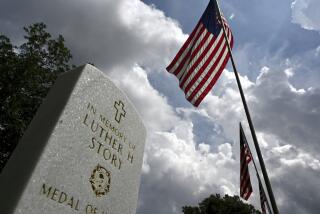White House defends vetting of Medal of Honor story
- Share via
White House Press Secretary Jay Carney said Thursday that President Obama remains proud to have awarded the Medal of Honor to Sgt. Dakota Meyer despite a report that suggests the account of Meyer’s acts was embellished and, in some cases, untrue.
As he presented the medal at a Sept. 15 ceremony, Obama recounted the official record of events of a Sept. 8, 2009, ambush in the Gangal Valley in eastern Afghanistan, in which Meyer is credited with saving the lives of 13 U.S. service members, killing insurgents at close range and repeatedly leaving his gun turret to rescue Afghan soldiers.
McClatchy Newspapers reported Wednesday that Obama was relying on an “inflated version of events,” that was constructed by the Marine Corps Public Affairs office.
There is no evidence that the White House knew the narrative had been altered. The changes were made after Obama approved the medal nomination, and the embellishment “probably was unnecessary” to justify the honor, according to the McClatchy report.
“The president was very proud to present the Medal of Honor to Sgt. Meyer,” Carney said. “He was that day and he remains proud today of his extraordinary service.”
Obama’s account of the events was, “based on the extensive documentation provided by the Department of Defense and the Marine Corps, including sworn testimony from Sgt. Meyer himself and sworn eyewitness testimonies of others present at the scene,” Carney said. He defended the vetting process as “quite extensive and thorough.”
Doug Wilson, assistant secretary of Defense for public affairs, told McClatchy on Thursday that there had been “absolutely no discussion of an investigation,” into the Marines’ medal process.
The McClatchy report, however -- which was based on a review of military documents by a correspondent who was embedded with the unit when it was ambushed -- suggests that the Marines’ official accounts are, “marred by errors and inconsistencies, ascribe actions to Meyer that are unverified or didn’t happen and create precise, almost novelistic detail out of the jumbled and contradictory recollections of the Marines, soldiers and pilots engaged in battle.”
For example, the claim that Meyer had saved the lives of 13 U.S. service members “couldn’t be true,” McClatchy determined, because only 12 Americans, including the correspondent, were ambushed.
Marine officials appeared to initially blame Meyer for the discrepancies, telling McClatchy that, “Meyer’s narrative of the sequence of events” was not vetted, and updating their official online account of Meyer’s actions to say it “was compiled in collaboration” with Meyer and the Corps’ public affairs office.
In a statement, the Marine Corps said it was “personally very disappointed,” that McClatchy had published the story, but didn’t directly challenge any of the assertions in the story.
As the wars in Iraq and Afghanistan wind down, the corps has been under pressure to quickly award more medals. Only 10 Medals of Honor have been issued in those conflicts – seven posthumously. By comparison, 248 medals were awarded in connection with the Vietnam War. Meyer was the first living Marine to be awarded the medal since Vietnam.
kim.geiger@latimes.com
More to Read
Get the L.A. Times Politics newsletter
Deeply reported insights into legislation, politics and policy from Sacramento, Washington and beyond. In your inbox twice per week.
You may occasionally receive promotional content from the Los Angeles Times.










